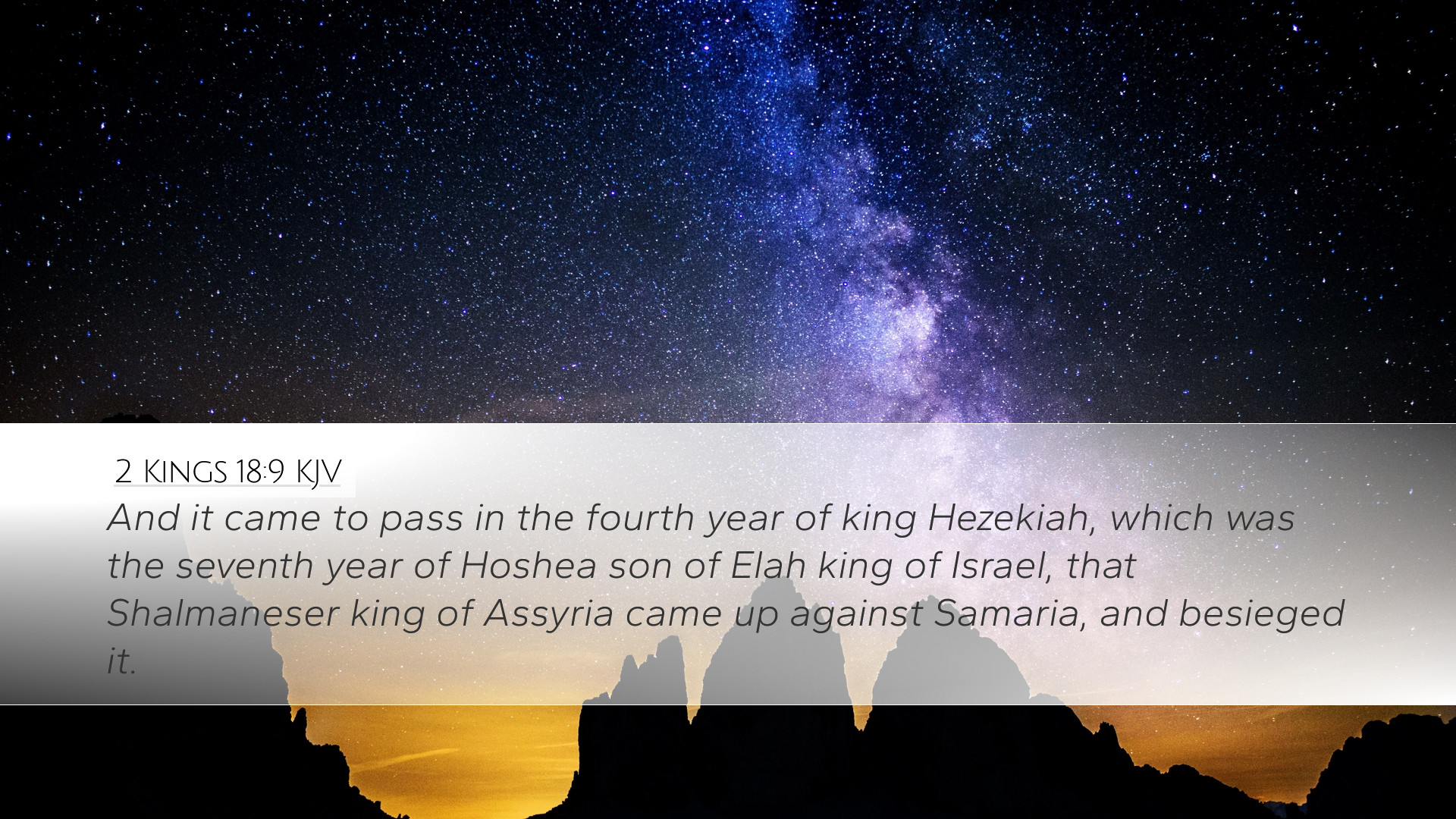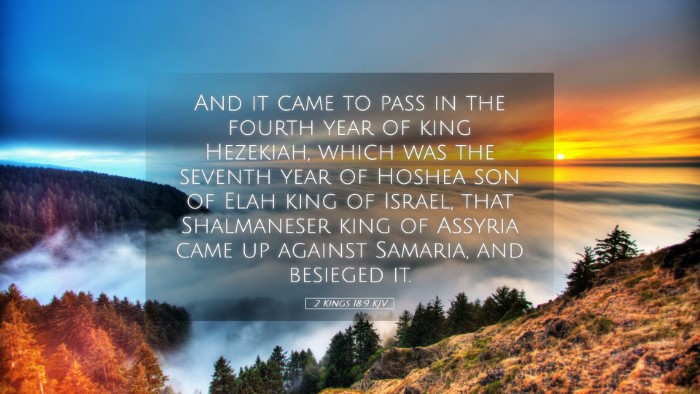Commentary on 2 Kings 18:9
In 2 Kings 18:9, we encounter a pivotal moment in the history of Judah, highlighting the nation’s vulnerability and the looming threat from Israel. To understand this verse more deeply, it is crucial to pull insights from renowned public domain commentaries from scholars such as Matthew Henry, Albert Barnes, and Adam Clarke.
Textual Context
This verse states: "And it came to pass in the fourth year of king Hezekiah, which was the seventh year of Hoshea son of Elah king of Israel, that Shalmaneser king of Assyria came up against Samaria, and besieged it."
It is essential to grasp the historical context surrounding this verse, establishing the timeline and the characters involved. Hezekiah, king of Judah, ascended to the throne during a tumultuous period marked by the Assyrian Empire's expansion.
Hezekiah’s Reign and Leadership
Matthew Henry's Commentary provides an overview of Hezekiah's reign, noting his desire to serve the Lord despite being beset by adversities. Hezekiah is portrayed as a king who sought spiritual renewal in Judah, contrasting starkly with his predecessors who turned away from God.
Henry emphasizes the importance of Hezekiah’s faithfulness, suggesting that this context amplifies the gravity of the events described in 2 Kings 18:9. His devotion ultimately plays a central role in how Judah responds to the threat of Assyria.
The Assyrian Threat
Albert Barnes expands on the nature of the Assyrian threat posed by Shalmaneser. He describes Assyria as a dominant military force, known for its brutal and efficient methods of conquest. Barnes elucidates that the siege of Samaria was not merely a military action but part of a strategic campaign to subjugate the northern tribes of Israel completely.
This insight shows that the actions surrounding 2 Kings 18:9 represent significant political machinations that are unfolding, which will have lasting implications for the region.
Historical and Theological Implications
Adam Clarke provides a theological reflection, interpreting the siege as a divine response to the idolatry and wickedness that had permeated Israel and Judah. Clarke views the siege as a symbol of divine judgment, reflecting God’s sovereignty over nations and His response to the moral decay of His people.
Clarke also emphasizes the prophetic warnings that had been given to Israel prior to this moment, asserting that the siege of Samaria serves as a direct fulfillment of prophetic words regarding the consequences of sin. Thus, the verse is steeped in both historical and theological significance.
The Significance of Timing
The verse opens with a precise time marker: "the fourth year of king Hezekiah." This detail is significant because it serves to align the events in Judah with the broader historical narrative of Israel, notably the reference to Hoshea, son of Elah, indicating the geographical and political interconnectivity of the two kingdoms.
- Timing: This episode is critical in understanding the transition of power in the region and the challenges faced by Hezekiah as he navigates threats both internally and externally.
- Lessons for Leadership: The verse indicates the pressure on leaders during times of crisis, underlining the necessity for spiritual reliance and strategic wisdom.
Application and Reflection
For pastors, students, and theologians, this commentary on 2 Kings 18:9 offers rich avenues for reflection:
- The Role of Faithfulness: How does Hezekiah's faithfulness encourage contemporary believers to respond to national and personal crises?
- Understanding Judgments: In what ways can modern Christians understand God's judgment in the face of societal failures?
- The Sovereignty of God: How does the divine orchestration of events inform our understanding of God's plan in history?
Conclusion
2 Kings 18:9 encapsulates a critical point in Israel’s history, unveiling key themes of leadership, faithfulness, and divine sovereignty. The insights drawn from the commentaries of Matthew Henry, Albert Barnes, and Adam Clarke collectively deepen our understanding of Scripture, urging leaders and congregations alike to heed the messages contained within.


